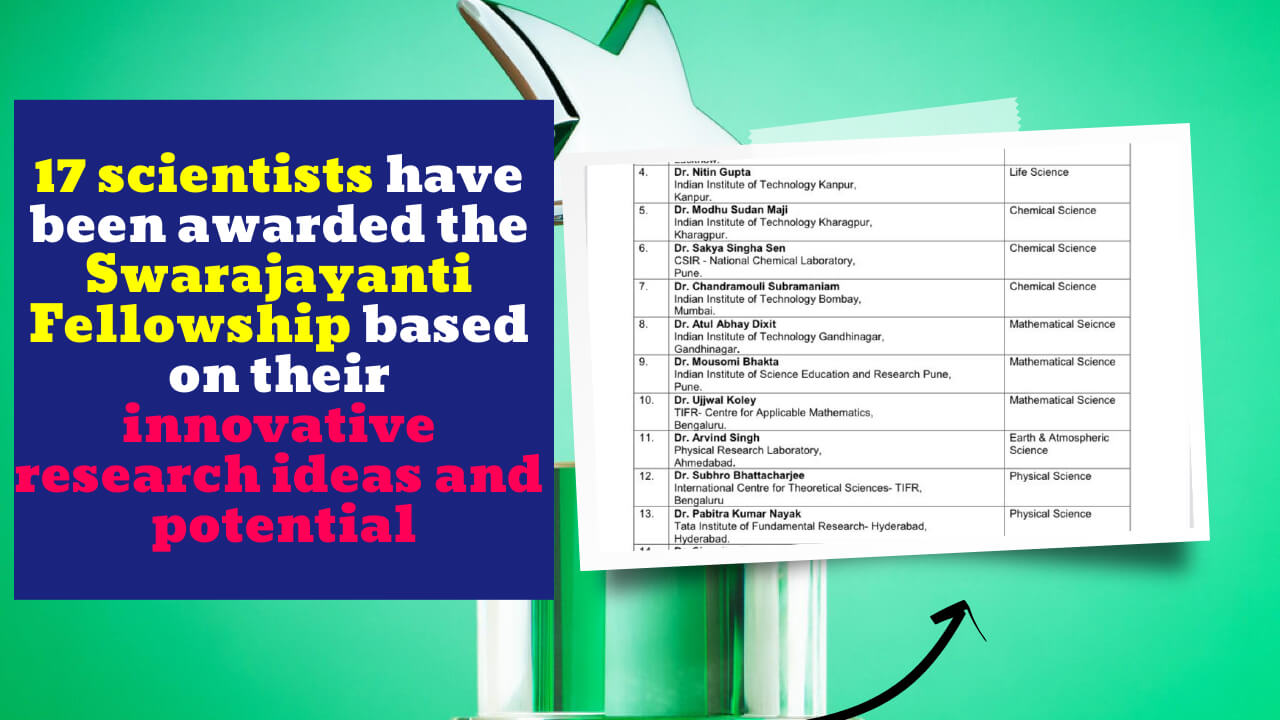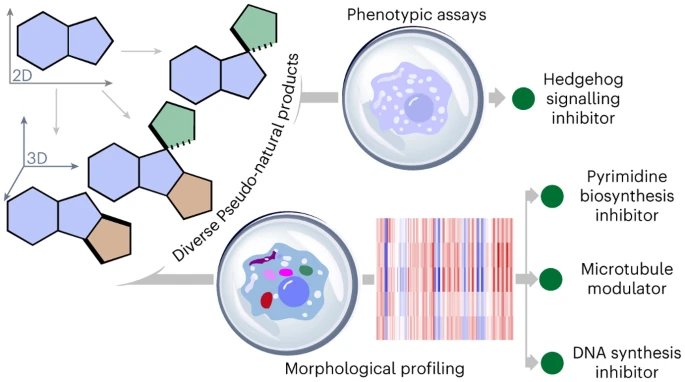The Indian government created Swanajayanti Fellowships to mark the country’s 50th anniversary of independence. Awardees are supported by the Government of India’s Department of Science and Technology (GOI) to carry out their research.
Key Highlight:
- The Indian government created Swanajayanti Fellowships to mark the country’s 50th anniversary of independence.
- Scientists with a proven track record will pursue basic research in frontier areas of science and technology.
- Awardees receive a five-year research grant of 5 lakh Rupees from the DST.
The Swarnajayanti Fellowships have been awarded to 17 scientists from scientific institutions across India for their innovative research ideas and potential to impact R&D in various disciplines.
The awardees will have the freedom and flexibility to conduct their research following the approved research plan. Scientists with a proven track record will pursue basic research in science and technology frontier areas and be selected through a rigorous three-layered screening process.
The Indian government established the Swanajayanti Fellowship program to commemorate India’s 50th anniversary of independence. For five years, the government of India will provide the awardees with all the resources they need to carry out their research, including a fellowship of Rs. 25,000 per month. Awardees receive a five-year research grant of 5 lakh Rupees from the DST. In addition to the salary they receive from their parent institution, they receive a fellowship. On top of that, merit-based grants are available for equipment, computing facilities, consumables, and travel to both domestic or international locations.
Brief Profile of the awardees
Dr. Siddhesh S. Kamat, Indian Institute of Science Education & Research Pune in life science: He studies the biological mechanisms of lipid signaling pathways in the mammalian nervous and immune system. He aims to provide new insights and therapeutic paradigms for orphan and/or emerging human neurological and immunological diseases.
Dr. Sridharan Devarajan, Indian Institute of Science, Bengaluru in life science. His area of work is Cognition, Computation and Behaviourencompassing’ how does our brain enable us to pay attention selectively to some things and ignore others or what happens in the brain when we make important decisions. His research focuses on understanding the neural basis of cognitive phenomena such as selective attention and decision making.
Dr. Niti Kumar, CSIR-Central Drug Research Institute, Lucknow, in life science. Her research is focused on understanding protein quality control machinery in human malaria parasites to explore alternative drug targets for malaria intervention. She is also involved in antimalarial screening for the identification of scaffolds effective against drug-resistant malaria.
Dr. Nitin Gupta, Indian Institute of Technology, Kanpur in life science. He works to understand the remarkable capabilities organized by the brain — from seeing to singing, from remembering to running. His research involves the electrical activity of neurons helps them interact, forming circuits that encode innate behavioral preferences.
Dr. Modhu Sudan Maji, Indian Institute of Technology Kharagpur, Kharagpur in Chemical Science. His research areas are Cobalt-catalyzed C-H bond functionalizations, sequential catalysis, design, synthesis, tunable nanographene application, and total alkaloids synthesis.
Dr. SakyaSingha Sen, CSIR – National Chemical Laboratory, Pune in Chemical Science. He and his team are exploring main group compounds in homogeneous catalysis as surrogates for precious metals to develop greener, safer, and more cost-effective chemical processes.
Dr. Chandramouli Subramaniam is from the Indian Institute of Technology Bombay in Chemical Science. He works on understanding the structure-property relations of nano-form of carbon allotropes – Carbon nanotubes (CNTs), graphene, and related doped nano carbons such as nitrogen and boron-doped CNTs and graphene. He uses nano carbon-based functional composites for developing sensors and actuators, primarily associated with biological systems.
Dr. Atul Abhay Dixit, Indian Institute of Technology Gandhinagar, in Mathematical Science. His research is at the interface of analytic number theory and special functions. His work in number theory has led him to discover new interesting special functions such as generalized modified Bessel and Hurwitz zeta functions.
Dr. Mousomi Bhakta, Indian Institute of Science Education and Research Pune in mathematical Science. She studies the existence and diversity of positive and sign-changing solutions to local and nonlocal elliptic equations applying nonlinear analysis tools and exploring various qualitative properties of solutions, e.g., radial symmetry, regularity, apriori estimate, etc.
Dr. Ujjwal Koley, TIFR in Mathematical Science. His work areas are Hyperbolic PDEs, Conservation Laws, Numerical Analysis, Dispersive Equations, and Stochastic Balance Laws. The main aim of his research has been to design mathematical tools and robust numerical algorithms and apply them to interesting problems that arise in the physical sciences.
Dr. Arvind Singh, Physical Research Laboratory, Ahmedabad Earth & Atmospheric Science. His work areas are marine nitrogen cycle, ocean biogeochemistry, marine C: N:P stoichiometry, anthropogenic impacts on marine nitrogen cycling, climate change, and isotopic fractionation processes. His expertise lies in using the stable isotopes of carbon (13C) and nitrogen (15N) to understand oceanic processes, focusing on biological nitrogen fixation and primary production.
Dr. Subhro Bhattacharjee, International Centre for Theoretical Sciences- TIFR, Bengaluru in Physical Science. He works on quantum many-body physics and focuses on magnetism (Frustrated magnets, quantum spin liquids), topological phases of condensed matter, and physics of transition metal oxides (Interplay of spin-orbit coupling and electron correlations), strongly correlated metals, and Many-body Chaos.
Dr. Pabitra Kumar Nayak, Tata Institute of Fundamental Research, Hyderabad in physical Science. His work area is soft semiconductor materials development, photovoltaics, optoelectronic devices, defect management, and electronic doping of soft semiconductors.
Dr. Shamik Banerjee is from the Institute of Physics, Bhubaneswar, in physical Science.
Dr. Rishi Raj is from the Indian Institute of Technology Patna engineering Science. His primary fields of interest are energy, boiling, condensation, micro-/nano-Scale Thermal and fluidic transport, colloids and interface science, microgravity science.
Dr. MayankShrivastava, Indian Institute of Science, Bengaluru in Engineering Science. He works on the Science and technology of electron devices focusing on power semiconductor devices and nanoscale / beyond Si CMOS for SoC applications. He also works on many science threads like physics of semiconductor device reliability, electro-thermal/electron-phonon interaction beyond Si materials/devices, thermometry, and thermal/phonon transport in these materials/devices.
Dr. Amartya Mukhopadhyay, Indian Institute of Technology, Bombay in Engineering Science. He works on materials for electrochemical energy storage and advanced structural ceramics/composites like electrode materials and electrode/electrolyte interfaces for Li/Na/K-ion batteries, solid electrolytes Li-ion and Na-ion batteries, electrochemical energy storage devices, development of bulk polycrystalline”ceramic alloy”, carbon nanotube reinforced ceramic composites and ultra-high temperature ceramics/composites.

17 scientists from across India awarded Swarnajayanti Fellowships. @DrJitendraSingh@IndiaDST@PIB_India@PBNS_India@DDNewslive@airnewsalerts
— PIB_Science and Technology (@PIBDST) November 8, 2021
More:https://t.co/qogL8oe6wa





[…] Swarnajayanti Fellowships are given to 17 Indian scientists for research ideas… […]